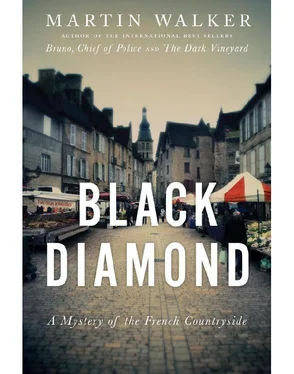Martin Walker - Black Diamond
Здесь есть возможность читать онлайн «Martin Walker - Black Diamond» весь текст электронной книги совершенно бесплатно (целиком полную версию без сокращений). В некоторых случаях можно слушать аудио, скачать через торрент в формате fb2 и присутствует краткое содержание. Жанр: Полицейский детектив, на английском языке. Описание произведения, (предисловие) а так же отзывы посетителей доступны на портале библиотеки ЛибКат.
- Название:Black Diamond
- Автор:
- Жанр:
- Год:неизвестен
- ISBN:нет данных
- Рейтинг книги:3 / 5. Голосов: 1
-
Избранное:Добавить в избранное
- Отзывы:
-
Ваша оценка:
- 60
- 1
- 2
- 3
- 4
- 5
Black Diamond: краткое содержание, описание и аннотация
Предлагаем к чтению аннотацию, описание, краткое содержание или предисловие (зависит от того, что написал сам автор книги «Black Diamond»). Если вы не нашли необходимую информацию о книге — напишите в комментариях, мы постараемся отыскать её.
Black Diamond — читать онлайн бесплатно полную книгу (весь текст) целиком
Ниже представлен текст книги, разбитый по страницам. Система сохранения места последней прочитанной страницы, позволяет с удобством читать онлайн бесплатно книгу «Black Diamond», без необходимости каждый раз заново искать на чём Вы остановились. Поставьте закладку, и сможете в любой момент перейти на страницу, на которой закончили чтение.
Интервал:
Закладка:
“They spent a lot of money on this place,” said Bruno, thinking about the likely size of the dinner bill.
“Fabiola doesn’t want to be treated by the baron, so she’s asked us all to pay our own way,” Pamela said, as if reading his mind. “And don’t worry about me. Thanks to Fabiola I’ve got a tenant through the winter for once, so I’m feeling unusually prosperous.”
She was suddenly backlit by the flare of headlights, and Bruno recognized the baron’s DS as it turned and parked. His friend emerged and moved swiftly to the passenger door to hold it open for Fabiola, who was renting one of Pamela’s vacation cottages.
“Fabiola came straight from work,” Pamela said. “Otherwise I’d have brought her. But I’ll take her back with me.” She looked at Bruno, her eyes twinkling affectionately. “And you too, if you’re good.”
“You’ll get a reputation,” he replied, watching her as she swept her hair back from her forehead, tucking it behind her ear in a way he knew well. Usually she wore no makeup but for this evening she had applied a dark red lipstick and mascara and done something artful that made her eyes look larger. She was wearing a long black raincoat that flared from her hips, a white silk scarf and high heels that gave her the same height as Bruno.
“You ruined my reputation months ago,” she said, taking his arm as the others joined them.
The restaurant was more than half full, rare in Perigord for a weekday evening in winter, with an unusual mix of customers. Some were well dressed in suits and ties and cocktail dresses while others were in dowdy casual clothes that probably counted as Green chic. Among them Bruno recognized a couple of people who sold organic foods at the St. Denis market and his friend Alphonse the councillor, who patted his stomach and gave Bruno a thumbs-up of approval for the food.
At the table beside Alphonse, Bruno noticed Didier, the manager of the truffle market in Ste. Alvere, dining in silence with a plump woman who wore a discontented air. There was a long table at the rear for a dozen that was filled this evening by a festive family group. A large balloon that read JOYEUSE ANNIVERSAIRE floated above a woman with white hair who was beaming at the well-dressed children beside her as they attacked two large pizzas.
“Welcome to L’Auberge des Verts,” said Guillaume Pons, signaling a young waiter to take their coats. Pons was wearing crisply pressed slacks and a starched white dress shirt, open at the neck. Its sleeves were rolled to his elbows, revealing what Bruno thought might be a Rolex. Pons’s good looks were marred by two black eyes and two thin strips of white tape across the bridge of his nose. His voice was thick and nasal, as if Axelle’s butting had given him a heavy cold.
“All my rescuers here at once,” Pons said, smiling gingerly, and pointed across the room to where Albert, the chief pompier, was dining with his wife. Albert raised a hand in salute.
“I’m afraid I ruined your clothes with my bloody nose,” he said to Pamela. “I had to throw my favorite shirt away, and I suspect you had to do the same with your shirt. I insist on buying you a new outfit. Good Samaritans shouldn’t have to pay for their kindness.”
“Not at all,” said Pamela. “It was an old skirt, anyway. I soaked it in cold water. It’s fine.”
“Are you sure?”
“Absolutely.”
Pons turned to Fabiola. “There must be a bill for your medical treatment.”
“Forget it. The damage doesn’t look too bad,” said Fabiola, in her brisk, professional way. She was wearing one of the dark trouser suits she always wore at work. It set off her trim figure. “Your bruises will go down in a few days, and the nose should heal by itself. Come and see me again in a week, and I’ll check your sinuses. You can pay me for that.”
Suddenly the door to the kitchen opened and the face of a small and very serious Asian girl peeked out. Pons turned and said something loud and firmly in what Bruno assumed was Chinese, and a tall Chinese man in a chef’s hat appeared behind the girl and pulled her back.
“Excuse me. One of the nieces of Minxin, my chef,” Pons explained. “You know how curious kids are.”
“In the meantime, Monsieur Pons, I’m getting hungry,” said the baron.
“Of course. But I do want to apologize for the way things got so out of hand at the sawmill,” Pons said. “Now let me show you to your table. And please call me Bill. When I hear ‘Monsieur Pons’ I look around for my father. Not a happy relationship, as you know.”
He smiled to take any reproof from his words and led them to a table by one of the large windows, screened by thick red drapes. He held a chair for Pamela, who somehow made the little black dress she was wearing look festive rather than formal, a wide red suede belt emphasizing her waist and the curve of her hips. Bill pointed to the ice bucket where a bottle of Bollinger awaited their arrival between two tall beeswax candles.
“With my compliments.” He ripped off the foil to open the bottle. “A small thank-you.” Bruno watched approvingly as Pons twisted the cork, not the bottle, and gave a gentle tap to the bottle’s base to reduce the foam. He carefully filled their glasses, and a young waitress appeared with four leather-bound menus and a wine list.
“I hope you know that this is an organic restaurant, and as much of the food as possible is grown locally,” Bill went on. “We want to offer a full wine list so we are not so strict there, but the bio wines are all marked. If you have any questions, just ask for me, and bon appetit.”
“The champagne is a pleasant gesture,” said Pamela, smiling, once their host had gone. She raised her glass and called for a toast to Bill’s generosity. Bruno nodded and sipped with the rest of them, despite the sense of discomfort he felt at accepting a gift for doing no more than his job. He had seen too many policemen taking free meals and other favors, and he knew that at some point they usually came with a price attached. That may have been the way Bill learned to do business in Asia, but that was not something Bruno wanted to see in St. Denis. Still, he smiled across the table to the baron, and he looked with pleasure at the two handsome women who flanked them, Fabiola’s dark hair piled almost formally high and Pamela’s hair glinting now bronze, now chestnut, in the candlelight.
“This place is grander than I’d expected,” said Fabiola.
“I’m not sure about this foie gras poele en etoile d’anis. It sounds like it would ruin a perfectly good foie gras,” grumbled the baron from deep within the menu. “Nor this fresh trout with lemongrass; you won’t be able to taste the fish. Still, the prices aren’t too bad.”
“But you like the way Bruno does his foie with honey and balsamic vinegar,” said Pamela. “This kind of change is just what we need around here. But do you think people in St. Denis will ever forgive Bill for closing his father’s sawmill? You were born here, Baron. What do you think?”
“The people who worked there will never forgive him. But that’s a small minority. Old-fashioned types like me regret its passing. But I do wonder about a son who breaks with his father like that, in such a public way.”
“It was the father who slapped him,” said Fabiola.
“After the son had tried to destroy the father’s business. And we all know how much we need jobs around here. So I’m reserving judgment on our inventive restaurant owner, at least until we’ve eaten his food.” He turned to Bruno. “Did you see Alphonse was dining with Jean Marillon?”
Bruno nodded. Marillon was one of the town’s pharmacists, and expected to be the Socialist Party’s candidate for mayor in the elections in May. He was a competent man but a lackluster candidate who had been beaten twice before by Bruno’s boss, the current mayor. If Marillon stood down and his Socialists forged an electoral pact with Alphonse’s Green Party, Bruno’s mayor could be facing a tight race.
Читать дальшеИнтервал:
Закладка:
Похожие книги на «Black Diamond»
Представляем Вашему вниманию похожие книги на «Black Diamond» списком для выбора. Мы отобрали схожую по названию и смыслу литературу в надежде предоставить читателям больше вариантов отыскать новые, интересные, ещё непрочитанные произведения.
Обсуждение, отзывы о книге «Black Diamond» и просто собственные мнения читателей. Оставьте ваши комментарии, напишите, что Вы думаете о произведении, его смысле или главных героях. Укажите что конкретно понравилось, а что нет, и почему Вы так считаете.












